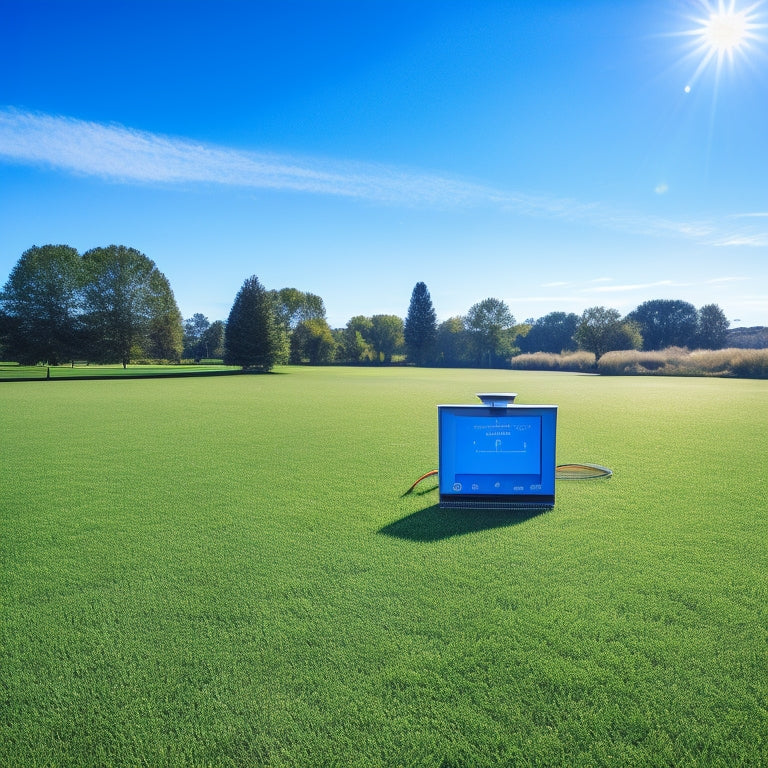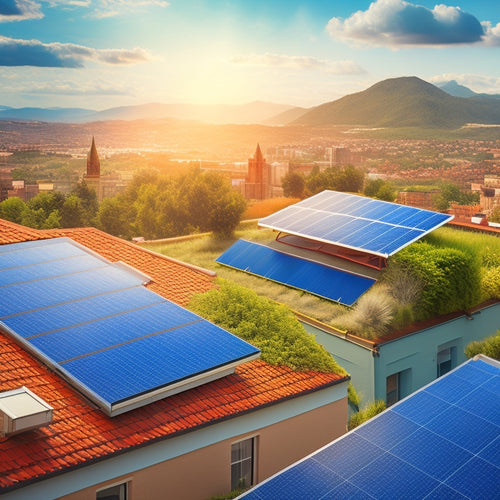
Why Conserve Water With Automated Irrigation Technology?
Share
By adopting automated irrigation technology, you're not only conserving water, a precious resource, but also reducing your environmental impact, cutting unnecessary waste, and saving on utility bills. With 90% efficiency compared to traditional methods, automated systems optimize water application based on real-time soil moisture and weather data, minimizing evaporation and runoff. This results in lower water consumption costs, reduced labor costs, and increased crop yields. As you investigate the benefits of automated irrigation technology, you'll uncover a whole new level of efficiency, precision, and cost-effectiveness that will help you make an even greater impact on sustainable practices.
Key Takeaways
- Automated irrigation technology achieves 90% efficiency, minimizing water waste and conserving this valuable resource for future generations.
- Real-time monitoring and data-driven insights optimize water application, reducing water consumption and saving on utility bills.
- Conservation of water resources through automated irrigation supports sustainable agricultural practices, ecosystem preservation, and environmental health.
- Efficient irrigation practices lead to increased crop yields and productivity, while reducing labor costs and overall water consumption.
- Integration of renewable energy sources, like solar, reduces carbon footprint, enhancing energy distribution and contributing to a cleaner environment.
Water Conservation Benefits
Water scarcity is a pressing global concern, and agricultural irrigation systems are among the largest water consumers worldwide. You can play an essential role in addressing this issue by adopting automated irrigation technology. By doing so, you'll contribute to sustainable practices that maintain ecosystem balance and promote agricultural efficiency.
Furthermore, integrating renewable energy sources, such as solar-powered fast charging, can further reduce carbon footprint and enhance energy distribution. Raising community awareness about water conservation benefits is vital, as it encourages responsible resource management and climate resilience.
With automated irrigation systems, you'll reduce water waste and optimize usage, ensuring that this precious resource is allocated efficiently. By embracing technological advancements, you'll be part of the solution to the global water crisis, protecting the environment and preserving freedom for future generations.
Smart Irrigation System Advantages
You'll appreciate the water efficiency guaranteed by smart irrigation systems, which optimize water distribution based on real-time soil moisture levels, weather forecasts, and crop water requirements.
By integrating renewable energy sources, such as solar energy, into your irrigation operations, you can further reduce your carbon footprint and operating costs.
With real-time monitoring control, you'll have complete visibility into your irrigation operations, allowing you to identify and address issues promptly.
Water Efficiency Guaranteed
Ideal resource allocation is the hallmark of a smart irrigation system, and its advantages are most pronounced in its ability to guarantee water efficiency.
By adopting sustainable practices, individuals and organizations can reduce their carbon footprint and contribute to a cleaner environment.
You can rest assured that advanced irrigation technologies will optimize water distribution, reducing waste and ensuring every drop is employed. This is particularly vital in water-scarce regions, where sustainable practices are essential.
By automating irrigation, you'll minimize overwatering and underwatering, which not only saves water but also reduces your water bill.
With a smart irrigation system, you'll have complete control over your water usage, making it an essential tool for environmentally conscious individuals and organizations seeking to adopt sustainable practices.
Real-Time Monitoring Control
Through real-time monitoring, a smart irrigation system enables you to stay on top of your irrigation operations, ensuring that every aspect of the process is optimized for maximum efficiency.
Automated sensors and environmental sensors provide real-time data on soil moisture levels, temperature, and humidity. This data is then analyzed using advanced irrigation algorithms, which adjust irrigation schedules based on moisture thresholds and plant water requirements.
With the increasing adoption of electric vehicles, it's crucial to take into account the energy generation and savings Solar-Powered Charging Stations that can be achieved through sustainable practices.
By leveraging data analytics and system integration, you can access this information remotely through user-friendly interfaces, making adjustments as needed. This level of control allows for precise irrigation optimization, reducing waste and ensuring your plants receive exactly what they need.
With remote access, you're always in control, no matter where you are.
Automated Watering Efficiency Gains
Frequently, farmers and gardeners struggle to maintain ideal water levels, resulting in overwatering or underwatering that can lead to reduced crop yields and wasted resources. By implementing automated irrigation technology, you can achieve significant efficiency gains. With drip irrigation, you can deliver water directly to the roots of plants, reducing evaporation and runoff. Irrigation automation takes it a step further by optimizing water application based on real-time soil moisture levels, weather data, and crop requirements.
| Traditional Irrigation | Automated Irrigation |
|---|---|
| 60% water efficiency | 90% water efficiency |
| 20% crop yield | 30% crop yield |
| Manual monitoring | Real-time monitoring and control |
Reduced Water Waste Guaranteed
You'll experience a significant reduction in water waste with automated irrigation technology, which guarantees precise water application to your crops.
Regular maintenance, including inspecting connections, is essential for optimizing performance and guaranteeing longevity, as regular cleaning of solar panels can prevent up to 20% efficiency loss.
Real-time moisture monitoring allows you to adjust irrigation schedules accordingly, eliminating overwatering.
Additionally, leak detection alerts notify you of any issues, giving you the opportunity to take prompt action and prevent unnecessary water loss.
Precise Water Application
Automated irrigation technology guarantees reduced water waste by employing precise water application methods.
You benefit from targeted watering that eliminates overwatering and underwatering. With drip irrigation, water is delivered directly to the roots, minimizing evaporation and runoff.
Soil sensors monitor moisture levels, adjusting water application in real-time to promote ideal hydration. This precision approach reduces water waste, saving you resources and money.
You're in control, making informed decisions about your water usage. By automating irrigation, you're free to focus on other aspects of your life, knowing your plants are receiving exactly what they need.
Real-time Moisture Monitoring
As you implement automated irrigation technology, real-time moisture monitoring becomes an essential component in assuring reduced water waste.
You can guarantee ideal soil health by integrating sensors that provide real-time data on soil moisture levels. This data enables you to adjust irrigation schedules accordingly, preventing overwatering and underwatering.
With real-time monitoring, you'll be able to detect even slight changes in soil moisture, allowing you to make data-driven decisions about irrigation.
Leak Detection Alerts
In conjunction with real-time moisture monitoring, leak detection alerts form a strong defense against water waste, guaranteeing that your irrigation system operates with peak efficiency.
By integrating automated leak detection into your system, you'll receive instant notifications when a leak is identified, allowing you to take swift action to prevent further waste.
This proactive approach enables you to implement effective leak prevention strategies and minimize the risk of water loss.
With automated alert systems, you'll have complete control over your irrigation system, receiving alerts via email, SMS, or mobile app notifications.
This guarantees that you're always informed and equipped to take corrective action, assuring reduced water waste and peak system performance.
Lower Water Bills Expected
By leveraging advanced weather forecasting and soil moisture monitoring, homeowners can expect significant reductions in their water bills thanks to automated irrigation technology.
You'll enjoy water bill savings as the system optimizes irrigation schedules, ensuring you're not overwatering your lawn.
With precise control over water application, you'll see an irrigation cost reduction that adds up over time.
Automated irrigation technology helps eliminate unnecessary water waste, resulting in lower water bills for you.
By taking the guesswork out of irrigation, you'll conserve this precious resource while also saving money on your utility bills.
With automated irrigation, you can rest assured that you're doing your part for the environment while also keeping more money in your pocket.
Increased Crop Yields Possible
Precise irrigation scheduling made possible by automated irrigation technology can greatly enhance crop yields. You can optimize irrigation timing to match the specific needs of your crop variety selection. By doing so, you'll guarantee that your crops receive the right amount of water at the right time, promoting healthy growth and development.
This results in increased crop yields and better quality produce. Automated irrigation technology also enables you to adjust irrigation schedules based on factors like soil type, climate, and weather patterns.
This level of precision allows you to make data-driven decisions, reducing waste and maximizing your yields. With automated irrigation technology, you're in control of your irrigation system, and your crops will thrive as a result.
Weather-Based Irrigation Control
How do you guarantee your irrigation system adapts to the unpredictability of weather conditions?
By integrating weather-based irrigation control into your automated irrigation technology, you can ascertain ideal water usage. This advanced system employs real-time weather data to adjust irrigation schedules accordingly.
It takes into account temperature, humidity, wind, and precipitation to determine the exact amount of water your crops need. This precision reduces the climate impact of irrigation, conserving this precious resource while maintaining healthy crop growth.
With weather-based irrigation control, you can rest assured that your irrigation system is working in harmony with the weather, not against it.
This state-of-the-art irrigation technology gives you the freedom to enhance your water usage, reducing waste and promoting a more sustainable future.
Real-Time Soil Moisture Monitoring
As you strive to optimize your irrigation system, real-time soil moisture monitoring becomes an essential component, providing you with instant observations into the hydration levels of your soil.
This allows you to pinpoint areas where soil health may be compromised, allowing you to take corrective action to improve moisture retention.
By continuously tracking soil moisture levels, you'll be able to identify trends and patterns, making data-driven decisions to adjust your irrigation schedule accordingly.
This precise monitoring guarantees you're not over- or under-watering, which can lead to reduced crop yields, increased water waste, and decreased soil health.
With real-time soil moisture monitoring, you're authorized to make informed decisions, promoting a thriving ecosystem while conserving this precious resource.
Customized Irrigation Scheduling Options
You can tailor your irrigation schedule to meet specific needs with automated irrigation technology.
You'll have control over watering frequency, making adjustments as needed, and you'll also benefit from weather-based adjustments that guarantee ideal watering.
Additionally, integrating real-time soil moisture monitoring allows you to fine-tune your schedule based on actual soil conditions.
Watering Frequency Control
Efficiency takes center stage with automated irrigation technology, where customized watering schedules are made possible through Watering Frequency Control.
With this feature, you can program ideal watering frequencies to cater to the specific needs of your plants. By setting the perfect watering intervals, you guarantee your plants receive the right amount of water at the right time, promoting healthy growth and development.
This precision control allows you to fine-tune your irrigation schedule, considering factors like soil type, plant species, and climate. By doing so, you enhance plant health while minimizing water waste.
Weather-Based Adjustments Made
Five days of consecutive rainfall or a sudden heatwave can greatly impact your plants' watering needs.
Automated irrigation technology adjusts to these weather patterns, guaranteeing your plants receive the right amount of water.
Irrigation sensors monitor temperature fluctuations, humidity levels, and rainfall predictions to enhance your irrigation schedule.
This climate adaptation guarantees drought resilience by making seasonal adjustments to maintain peak moisture retention.
By considering soil types and local weather patterns, the system fine-tunes watering schedules to match your plants' specific needs.
This means you can enjoy a lush, thriving environment while conserving water and reducing waste.
With automated irrigation technology, you're free to focus on other aspects of your life, knowing your plants are receiving the perfect amount of water, every time.
Soil Moisture Monitoring
The soil moisture monitoring component of automated irrigation technology allows for customized irrigation scheduling options, ensuring your plants receive the precise amount of water required.
This feature enables you to optimize water usage, promoting soil health and reducing waste. By continuously monitoring soil moisture levels, you can identify areas that require more or less water, adjusting your irrigation schedule accordingly.
Advanced irrigation technologies integrate soil moisture monitoring with weather-based adjustments, ensuring your plants receive the perfect balance of water and nutrients.
With automated irrigation technology, you can enjoy freedom from manual watering and the confidence that your environment is thriving while conserving this precious resource.
Environmental Impact Mitigated
Water scarcity and waste are pressing concerns in modern agriculture, and automated irrigation technology plays an essential role in mitigating these issues.
By adopting automated irrigation systems, you're contributing to sustainable practices that prioritize ecosystem preservation. Overwatering, a common problem in traditional irrigation methods, is considerably reduced, which in turn decreases water waste and conserves this precious resource.
Additionally, automated irrigation technology guarantees that water is distributed efficiently, reducing evaporation and runoff, and minimizing the environmental impact of your farming practices.
Frequently Asked Questions
Can Automated Irrigation Systems Be Integrated With Existing Irrigation Infrastructure?
You can seamlessly integrate automated irrigation systems with your existing infrastructure, ensuring system compatibility and minimizing the need for infrastructure upgrades, allowing you to optimize water usage and reduce waste.
How Do Weather-Based Irrigation Controls Account for Unexpected Weather Changes?
You're likely aware that 70% of the world's freshwater is used for irrigation. Weather-based irrigation controls account for unexpected weather changes by continuously monitoring weather patterns and adjusting irrigation schedules in real-time to optimize irrigation efficiency, ensuring you're only using what's needed.
Are Real-Time Soil Moisture Monitoring Sensors Easy to Install and Maintain?
You'll find that real-time soil moisture monitoring sensors are relatively easy to install, but you'll need to verify proper calibration for ideal sensor accuracy, and be prepared to overcome potential installation challenges, such as soil type and density variations.
Can Customized Irrigation Scheduling Options Be Adjusted for Different Crop Types?
You'll be surprised to know that 70% of global freshwater is used for agriculture. When you adjust customized irrigation scheduling options for different crop types, you can optimize crop water requirements, increasing irrigation efficiency and minimizing waste.
Are Automated Irrigation Systems More Expensive Than Traditional Irrigation Methods?
When you compare costs, you'll find that automated irrigation systems might be more expensive upfront, but they offer long-term savings through optimized water usage and reduced labor costs, making them a worthwhile investment for your freedom to focus on what matters.
Related Posts
-

3 Best Solar-Powered Biodegradable Accessories for Your Home
You're taking a significant step towards a more sustainable lifestyle by incorporating solar-powered biodegradable ac...
-

7 Best Geothermal Cooling Systems for Hot Climate Homes
You're evaluating geothermal cooling systems for your hot climate home, and you want to know the top options. Look fo...
-

What Roofing Materials Best Protect Our Planet?
As you consider the environmental impact of your building, you're likely to find that the roofing material you choose...


